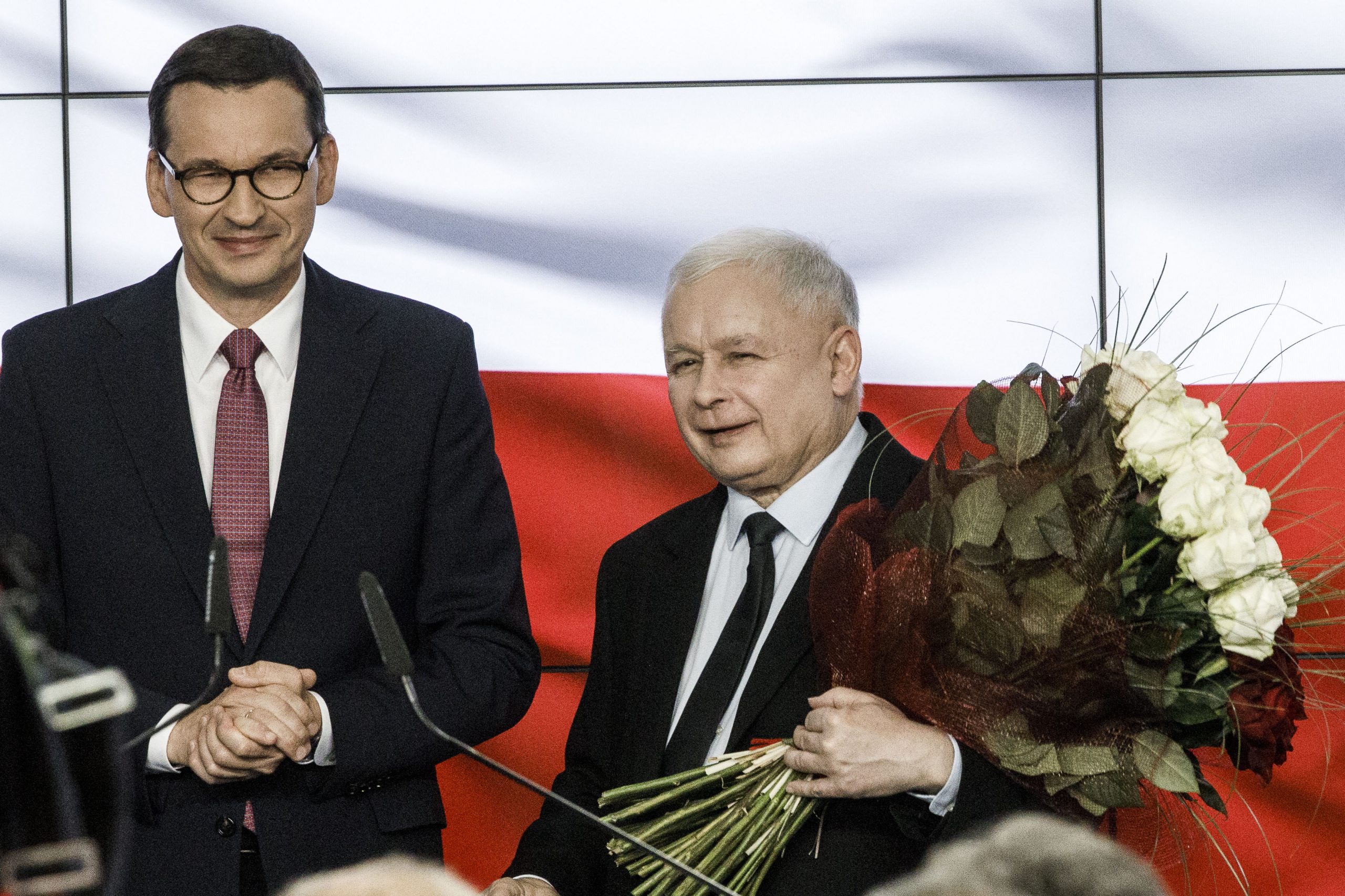
For a state experimenting with new forms of social spending, look no further than Poland. Since entering power in 2015, the Law and Justice party (known by its Polish acronym, PiS) has been building what its 70-year-old leader Jarosław Kaczyński calls the “Polish version of the welfare state”. His administration is also among the most conservative governments in Europe on social issues, such as LGBT equality and abortion rights. Through this distinctive blend of left-inspired economics and right-wing traditionalism, PiS comfortably secured a second four-year term in the Polish general election on 13 October.
With almost all of the vote counted, PiS had a share of 43.8 per cent, putting it far ahead of the centrist opposition led by the Civic Platform (PO) party, which had 27.2 per cent. The left alliance finished third with 12.5 per cent, followed by the agrarian and Christian democratic Polish Coalition (8.6 per cent) and the far-right Confederation Freedom and Independence (6.8 per cent). These results suggest that PiS will maintain its absolute majority in the 460-seat Sejm, the upper chamber of parliament.
PiS is like Brexit: it polarises. On the one hand, the party has been widely criticised for its illiberal direction: efforts to control Poland’s public television broadcaster and its courts have proved especially divisive – the European Commission has warned the rule of law is being undermined. On the other hand, it has successfully grasped the mood in Poland, especially among voters outside major cities such as Warsaw, Wrocław and Gdańsk, who feel alienated by the economic, social and cultural changes since the collapse of communism in 1989.
Although the party is often described as “right wing”, PiS has embraced economic ideas usually associated with the left, such as state interventionism and high welfare spending. Its flagship policy, introduced in 2016, is a monthly benefit of 500 złoty (£102) per month per child, originally from the second onwards, except in low-income families. In advance of the election, it extended the policy to all children and added an array of other policies, including a one-off bonus payment of 1,100 złoty (£225) to pensioners, the abolition of income tax for workers aged 26 and under, and an increase in the minimum monthly wage from 2,250 złoty (£461) to 4,000 (£815.50) złoty by the end of 2023 – a 78 per cent rise.
These policies are accompanied by a significant price tag: the government estimates that they will cost 30-40 billion złoty (£6-8bn) per year, which it has vowed to raise by improving tax collection and reducing administrative costs. But they will also help maintain economic growth: GDP rose by 5.1 per cent last year (faster than any EU countries except Malta and Ireland).
In view of Poland’s post-war experience, when its larger neighbour, the Soviet Union, imposed a communist government, PiS has avoided the word “socialism” when describing its economic vision. Instead, it speaks of “solidarity”; of reforming capitalism to provide people with an enhanced safety net, rather than abolishing the free market. “I’ve even been called upon to confess that I am a socialist. Well, I am not a socialist, I am a supporter of social solidarity,” said Kaczynski in an interview with TV Trwam, a conservative television channel owned by a Roman Catholic priest, on 2 October.
PiS has fused such economic interventionism with right-wing social policy. In 2015, it rallied voters by presenting itself as the only party capable of protecting Poland from refugees from North Africa and the Middle East, whom it presented as a threat to security. This year, its target was the LGBT community. With support from the Roman Catholic Church, PiS ran a persistent campaign presenting gay people as a threat to the family, especially children. “Just as Marxism was an ideology, LGBT is now an ideology of this kind,” Kazimierz Smoliński, one of the party’s MPs, told the public television broadcaster TVP in July.
Such dehumanising rhetoric led to a counter-reaction. On Twitter, LGBT Poles used the hashtag #jestemLGBT (I am LBGT) to demonstrate that they were normal people living ordinary lives, rather than a threat. “Hey, I’m Jakub, I’m an artist, future IT technician and cat dad. I hope that these kinds of hashtags will no longer be needed soon,” a user wrote with the hashtag and a photo of himself on 9 October.
“Hi, I’m Natalia and #jestemLGBT. I would like to be able to go out into the street with [my] girlfriend, hold her hand, be able to kiss her without fearing that someone will run up in a moment and hurt us. I would like people to finally understand that we are the same as they are. I don’t want to be afraid to live in Poland,” another user tweeted that week.
Within the opposition, the most significant election development was the re-emergence of the left. After a disastrous result in 2015, when it failed to cross the threshold for parliamentary representation (8 per cent for coalitions), it has escaped irrelevance. The Democratic Left Alliance, the long-standing social democratic party, joined forces with two newer parties, Together (Razem) and Spring (Wiosna), the progressive party established earlier this year by gay rights activist and former Słupsk mayor Robert Biedroń.
Like PiS, the left has emphasised the need for greater social protection. Biedroń, who was elected to the European parliament in May, speaks of creating a Poland “where no one is left behind”. In contrast to PiS’s social conservatism, the left’s programme includes support for gay marriage, abortion rights and environmental protection. Exit polls suggest that it could secure more than 40 MPs. A contrasting trend, however, is the rise of the far-right Confederation, an alliance of nationalist parties whose platform is homophobic, anti-immigration and eurosceptic.
Poland’s election demonstrated how welfare policy has moved to the centre of the political debate, encouraged by both the right and a revived left. Yet for as long as PiS retains power, such measures will remain tied to its traditionalist social vision.






